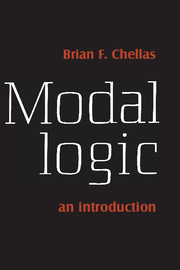7 - Minimal models for modal logics
Published online by Cambridge University Press: 05 June 2012
Summary
The truth conditions for modal sentences in minimal models are a generalization of those in chapter 3. Possible worlds continue to figure in the semantic analysis of necessity and possibility, but the meanings of modal sentences are given a much simpler account. A necessitation □A is said to be true at a possible world just in case the proposition expressed by A is in a certain but very general sense necessary with respect to the world; and ◇A is true at a world if and only if the proposition expressed by A is, in a corresponding sense, possible. The resulting notion of validity is such that far fewer principles hold generally on this account than did in chapter 3.
In section 7.1 we set out the definition of a minimal model, state the truth conditions of modal sentences, and prove the basic theorem about validity in classes of minimal models. In section 7.2 we examine M, C, and N from the standpoint of minimal models and define some key concepts for the treatment of certain logics involving these schemas. Section 7.3 contains a theorem to the effect that standard models can be identified with minimal models of a special kind. Section 7.4 briefly describes conditions on minimal models sufficient for the validation of the schemas D, T, B, 4, and 5.
Information
- Type
- Chapter
- Information
- Modal LogicAn Introduction, pp. 207 - 230Publisher: Cambridge University PressPrint publication year: 1980
